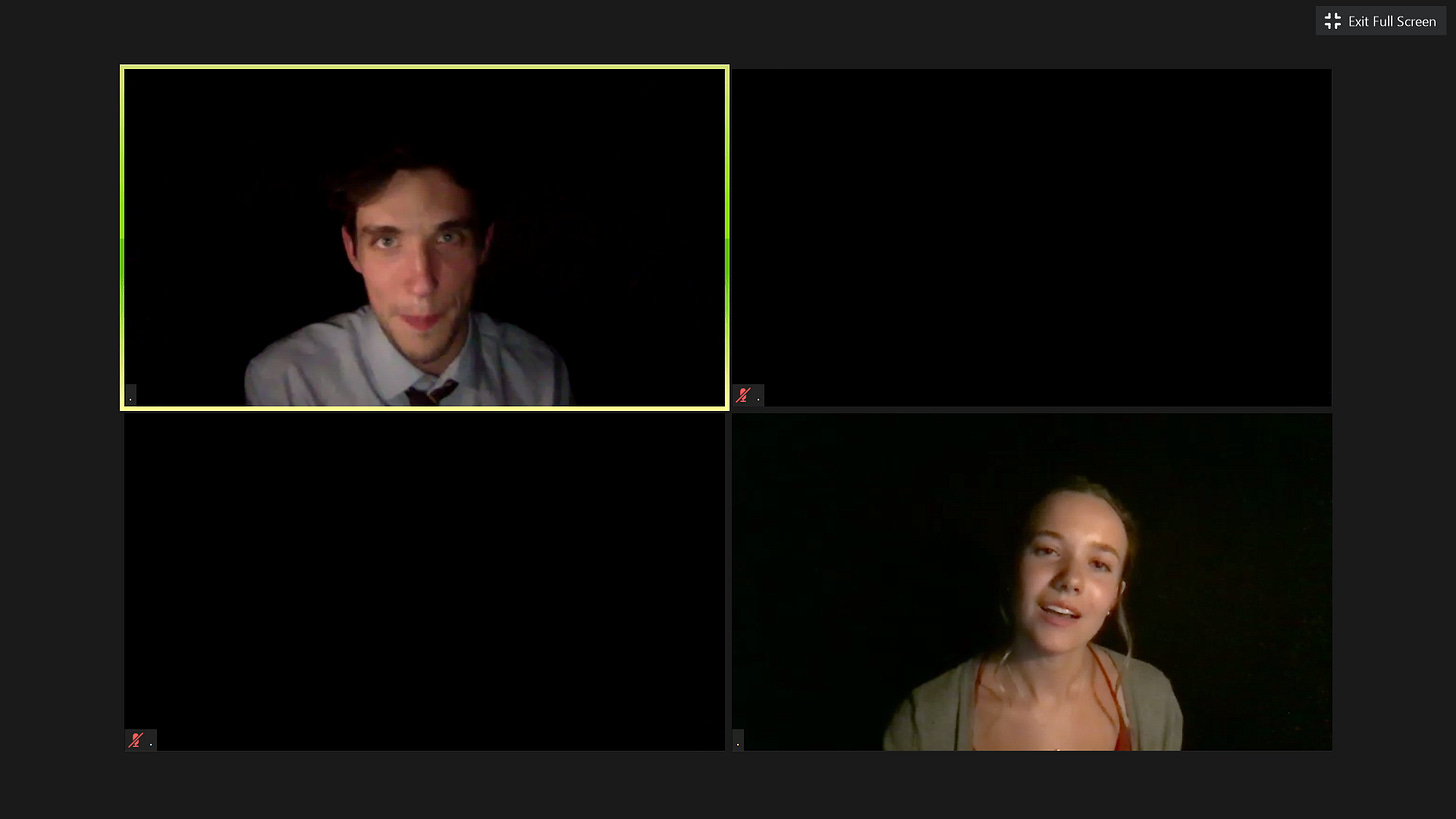Heroes
Did the Zoom start or is my computer haunted
Usually it’s a smiling face asking us to “take our seats” (har-de-har). Last night’s Zoom instead greeted us with the fuzzy, worrisome outline of…something, off in the distance.

It marks probably the first attempt I’ve seen at an opening stage image in a Zoom reading. It eventually moves, revealing itself - improbably - to be a man. *shiver*
Wandering Brooklyn ahead of tonight’s reading, I wondered if Will Arbery’s Heroes of the Fourth Turning was a horrendous choice for Zoom. Sure, the play is essentially a two-hour debate around a campfire, and talky is easier to manage online. But talky is also treacherous - little boxes going at us for a long time can prove numbing. At Playwrights Horizons last year, the play’s power was tied to Danya Taymor’s moody, frightening staging, so pitch-black that it felt like a bloodthirsty animal could leap out from the darkness at any moment.
The first chunk of Taymor’s Play-PerView staging, starting with that unnerving opening image, managed to replicate that terror with surprising precision. The actors sat in total blackness and, save for a couple police sirens that slipped through, eerie silence. Their bodies moved in and out of frame in a dreamlike manner, echoing an effect of Isabella Byrd’s lighting on stage (Byrd is also credited here as lighting designer). The play’s opening gunshot, and Justin’s panicked response in the darkness afterwards, is just as unnerving here.
Not everything worked. On stage, events were frequently interrupted by a blaring ‘generator’ sound effect that truly terrified. The reading re-used that cue (sound designer Justin Ellington is also credited), but it just didn’t blare in the same way. Saddest of all, the show’s most riotously hilarious sight gag - Kevin vomiting mid-Rosary - did not land at all. We didn’t really hear the vomit, and if your eyes were on a different box, you might well have missed it.
(Related: one Zoom challenge is that you can’t ‘cut-to’ a particular screen, immediately removing all the other boxes, except by carefully timed mouse clicks that close several windows simultaneously. If you get the timing even a little wrong, the boxes instead disappear one by one, which feels off. This reading mostly dodged the issue by letting unoccupied boxes just sit there, filled with darkness - this also helped with mise en scène, so it was a win-win.)

Past about the half hour point, Taymor and co. were mostly out of tricks for building atmosphere in Zoom. It came down to the text. Arbery’s play is just wondrous. It should not work, for many reasons - long debates about political hot topics, no plot to speak of, a direct timeliness that is so hard to pull off.
For me, the biggest pleasure is how beautifully the play builds to the arrival of Dr. Gina Presson (the magnificent Michele Pawk). I love a total wrecking ball of a character - the late arrival who waltzes in, knocks everyone askew, then saunters off. Pawk is just so ferociously smart, and so casually dominant over this group of smart but deeply lost souls. You feel for them deeply; and you are glad to see her demolish them. It is killer writing.
Arbery’s observations about Catholic conservative politics are not prescient - the play was just premiered last year, and all the dark turns it reflects were already happening. But if one section resonates the strongest right now, it is probably Justin’s confession that he does expect war with the left, and his fear that the left’s greater numbers and institutional power might lead them to victory. That brand of delusional victim narrative is, today, only more frightening. As black Americans rise up to demand an end to police murders while a Republican president sits back and allows thousands of Americans to die needlessly, that strange victim narrative continues - whether in pearl-clutching over Confederate statues, or the cancel culture debate, or whatever might be next. So many lost, confused Americans still imagine themselves as ‘heroes’ waiting for the imaginary battle just over the next hill, while the very real crisis stares them in the face.


